Won't peel or fade! Odorless paint for heating batteries, selection features
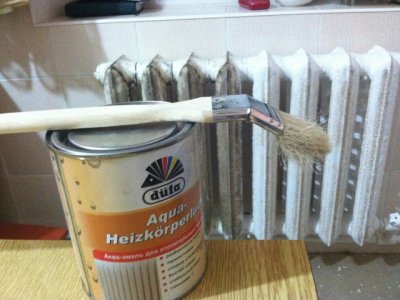
New heating radiators are ready for use - they are coated with a special coating at the factory, which performs a protective and aesthetic function.
But in a few years the enamel cracks, chips and cracks appear on it, which not only spoils the appearance of the heating devices, but also leads to corrosion of the metal.
In such a situation, the radiators require painting. To do this, at home, it is important to know how to choose paint for batteries and apply it to the surface correctly.
Content
Features and types of paint for heating radiators
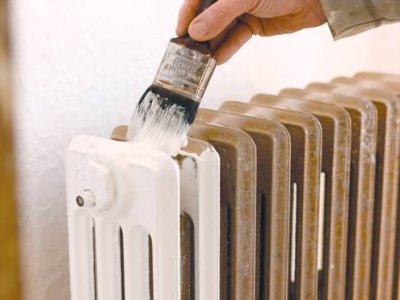
Considering that the paintwork is constantly exposed to high temperatures, it must be heat resistant.
For this reason not all types of compositions are suitable for batteries: regular paint quickly cracks and loses its appearance.
The second requirement for the coating is resistance to mechanical damage, which allows 4-5 years do not worry about repainting batteries. Manufacturers offer several types of compounds developed specifically for heating radiators.
Acrylic enamel without smell
It consists of resins, pigments and organic additives, special components that provide high anti-corrosion properties and heat resistance. Features of acrylic enamels for radiators:
- quick drying;
- smooth shiny surface after painting;
- abrasion resistance.
Important! The color of this composition is snow-white, if it is necessary to create a coating of other shades, add to the base color of the desired color.
Acrylic enamel for batteries is practically does not emit an unpleasant odor due to its water base. The heat resistance index of such a composition is up to 80 °CThis is lower than that of water-dispersion paints, but practice shows that this is quite sufficient.
Water-dispersible
Water-based paints for radiators differ in their composition: They use polyvinyl acetate dispersion, latex or acrylate as a binding component.
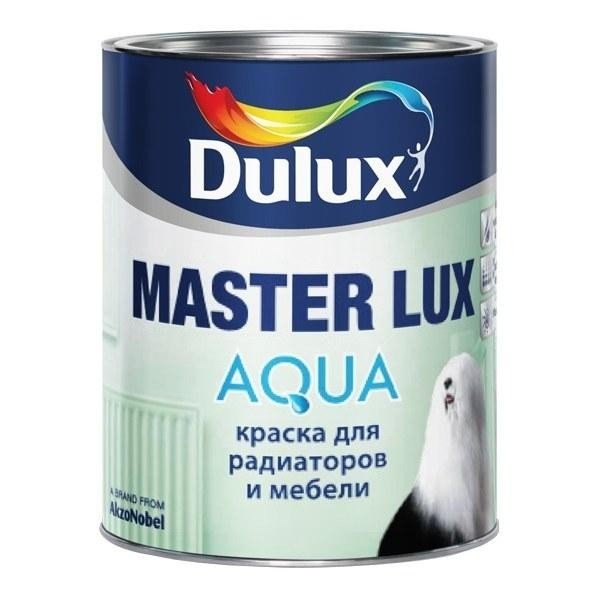
Photo 1. Water-dispersion paint intended for application to heating radiators and furniture. Manufacturer Delux.
Advantages of this type of composition:
- virtually odorless;
- the coating layer is uniform and durable;
- ease of application.
The only drawback of this type of composition is their very high price, which reaches up to more than three thousand per pack in 2.5 kg.
How to choose the right paint
It is better to buy paint in a specialized construction store - this way you can avoid the risk of buying a fake. When choosing, you should adhere to the following rules:
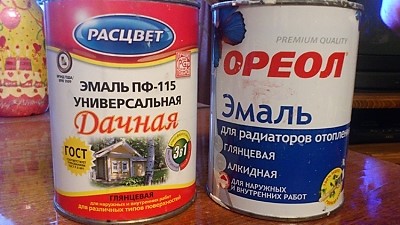
- The packaging must indicate that The composition is suitable for painting heating radiators. If you do not find such a mark, you do not need to buy enamel: compounds for walls and other surfaces are not suitable for batteries.
- On quality goods The country of manufacture and company name must be indicated.
Enamel It can be matte, glossy and semi-glossy. Here the choice is ambiguous: matte compositions hide surface defects well, but over time the pores of the coating become clogged with dust, and it turns grey. Therefore, if the unevenness on the radiators is insignificant, it is preferable to use glossy or semi-glossy compositions.
Features of painting batteries
To ensure that the paint on your heating radiators lasts a long time, it is necessary perform the procedure correctly coloring.
Removing old coating and applying putty
Before painting radiators, some preparatory work should be carried out.
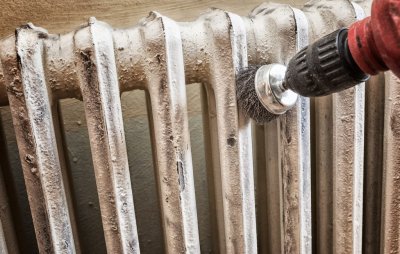
First you need to wash away dirt from the surface, after which clean the battery with fine sandpaper, to remove any paint that is not firmly attached.
If as a result fragments of the coating remain on the surface, then the recesses between them must be coated metal putty, wait for it to dry and sand the radiator to achieve a perfectly smooth surface.
Priming the surface
At the next stage primer is applied, to improve the adhesion of the paint to the metal. Afterwards, the primer should dry for as long as indicated on the package.
Attention! When purchasing a primer, you cannot use the one that is intended for wood or plaster.
Selection of brushes
The final stage is coloring. To achieve maximum effect, Make sure you have the necessary tools:
- Straight brush is used to paint the outer surface of the battery. Another option is to use a roller or a spray gun instead.
- Curved brush — it is convenient to use it to process the rear surface and hard-to-reach places inside the radiator.
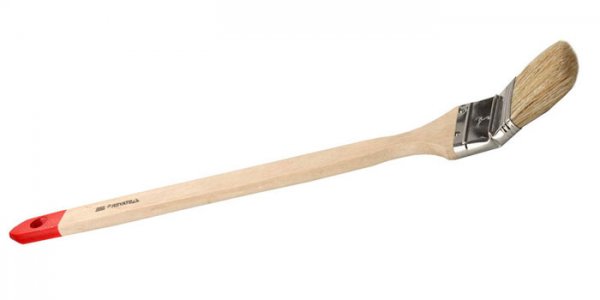
Photo 2. A special brush for painting heating radiators. It has a curved shape, which allows you to reach hard-to-reach places.
The dyeing process
The wall behind the radiator and the floor cover with film, After which, enamel is applied with a curved brush to the internal parts of the structure and its back surface. Then, the external part is painted with a straight brush, roller or spray gun.
Reference. It is best to paint the battery in the summer, but if it needs to be done in the winter, then on the paint packaging you should look for an indication that it is Suitable for painting hot radiators.
Applying the second layer
After application first layer You need to wait for the paint to dry for a certain amount of time, which is indicated by the manufacturer on the packaging. Second layer It is applied only to the outer surface of the radiator, which gives it a more aesthetic appearance.
Useful video
Watch the video, which tells you how to properly paint cast iron heating radiators.
Factors Affecting the Quality of Painting
The durability of the paintwork of batteries depends from the quality of the primer, putty and paint, and also from compliance with the painting technologyThe choice of materials should be approached seriously, otherwise the enamel will come off the surface, and the procedure will have to be started over again.









Comments
Today the market is full of offers and variety of choice, there is paint for radiators, and there is for batteries, there is water-based, and there is solvent-based, and heat resistance is different everywhere. Such paint does not turn yellow during use.
Before painting, it is recommended to clean EVERYTHING (wire brush and sandpaper).